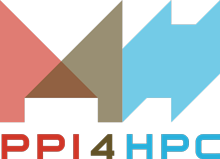
Marconi-100, the newly installed supercomputer at CINECA, acquired through the PPI4HPC procurement process, is contributing to the research conducted by the Exscalate4CoV consortium in the fight against the novel coronavirus SARS-CoV-2.
The EU-funded project Exscalate4CoV consists of a private-public consortium led by Dompé Farmaceutici and 18 other partners. Their research has intensively used the resources of the European supercomputing centers installed at CINECA, Eni, Barcelona Supercomputing Center and FZ Juelich to simulate the interactions between the proteins of the coronavirus SARS-CoV-2 and the molecules of potential therapeutic drugs, in an attempt to discover an effective drug therapy for the new virus.
Thanks to the acquisition accomplished via the PPI4HPC project, part of the project’s activities are exploiting the Marconi-100 system at the CINECA Italian supercomputing center. Marconi-100 is one of the most powerful supercomputers in Europe, according to the TOP500 list of the fastest supercomputers in the world, announced on 22 June 2020 at the ICS High Performance virtual conference. Powered by IBM Power9 processors, NVIDIA V100 GPUs and dual-rail Mellanox EDR InfiniBand network, the system reached 21.6 PetaFLOPS and 29.4 PetaFLOPS peak performance.
During the last months, the first virtual (in silico) screening phase of Exscalate4CoV was run on the Consortium’s supercomputers to process more than 400.000 molecules (safe-in-man drugs and natural products). In the second phase of virtual screening, the Exscalate platform is planning to identify highly specific new molecules for the development of post-emergency solutions for SARS-CoV-2. During this second phase, the virtual screening will be extended to the overall chemical library of 500 billion molecules, thanks to the Exscalate processing capacity of more than 3 million molecules per second.
The valid interactions will then be examined in the next phases of the drug discovery pipeline. This immense effort will be followed by experimental validation by the Consortium partners, both in the direction of structural complexes elucidation and mechanistic elucidation at biochemical and cellular levels.
During the last months, the first virtual (in silico) screening phase of Exscalate4CoV was run on the Consortium’s supercomputers to process more than 400,000 molecules (safe-in-man drugs and natural products). From this screening 7000 molecules were identified and selected to be tested in the laboratory. The tests revealed 100 to be active in cell cultures, and in particular 40 were found to have an effect in limiting virus replication. One of these, an already approved generic drug known as raloxifene, was identified to be particularly promising with the result that application has been made to the European Medical Agency (EMA) in order to perform clinical trials.
